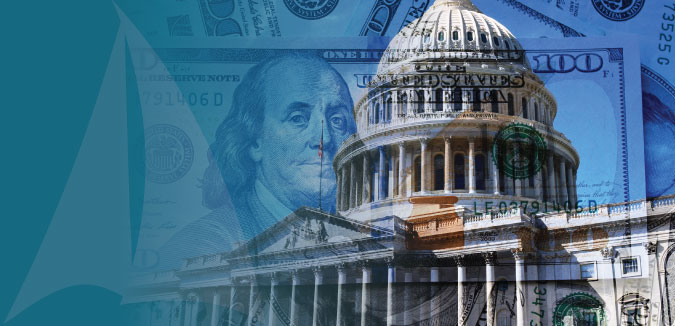featured
2025-11-07
Banking News
published
4 Minutes
A government shutdown isn’t just a headline; it can create real financial challenges, and the ripple effects can quickly reach your wallet—impacting everything from paychecks to mortgage closing, and even tax returns.
While many essential financial systems, banks for example, keep up and running, that doesn’t mean that there are no interruptions to usual processes or even severe impacts to your finances.
First things first: what actually shuts down?
When federal funding expires and Congress doesn’t approve a new budget or temporary extension, many government agencies pause or scale back operations. Essential functions continue, but hundreds of thousands of federal workers may be furloughed or required to work without pay. Government contractors can also see delayed work or paused projects.
That shift in government operations creates ripple effects across the economy – especially in areas where federal support is tightly linked to financial services.
While banks remain open – they are not immune to the ramifications of Government shutdowns.
So, where will things stay fairly normal and where can we expect to see disruptions? Here’s a practical breakdown of what happens and how to stay prepared.
Where things stay normal:
Banks And Credit Unions Remain Open
Even during a government shutdown, financial institutions continue operating as usual. Your local bank or credit union will continue to provide access to in-person services, customer support, and account management.
Deposit Insurance (FDIC/NCUA) Remains Fully Intact
Your money remains protected. The Federal Deposit Insurance Corporation (FDIC) continues to insure deposits up to the legal limits, ensuring your funds are safe regardless of federal disruptions.
Payment Processing, ATMs, and Online Banking Continue Uninterrupted
Core banking infrastructure—including direct deposits, bill payments, ATM withdrawals, and mobile banking—remains fully functional. You can continue managing your finances without interruption.
The good news is that these systems are built to keep running no matter what is happening in Washington, meaning banks can continue to work for their customers throughout the duration of the shutdown.
Where disruptions show up:
Mortgage Delays
Home loans backed by FHA, VA, or USDA may get held up because fewer federal workers are available to process approvals or verify documentation.
Federal Flood Insurance Paperwork
Closings in flood-risk areas can be delayed if flood insurance processing is disrupted.
Customer Financial Strain
Banks in communities with many federal workers may see rising demand for short-term help — fee waivers, payment extensions, or low-interest emergency loans.
Economic Uncertainty
Prolonged shutdowns can reduce consumer confidence, which may affect lending, investments, and spending.
In short, banks themselves remain financially stable and fully operational during a government shutdown, however the financial needs of their customers may shift.
How everyday consumers feel the effects:
- Paychecks pause for federal employees and contractors: Missing pay, even temporarily, can strain budgets. Even though the paychecks stop coming, the bills do not. Households may struggle to pay bills on time, delay purchases, lean more on credit, or have to start tapping into their savings.
- Tax processing slows: The IRS may reduce staffing, so responses, refund checks, and phone support can take longer. This doesn’t stop the filing season but can complicate anything requiring hands-on review.
- Homebuying can get complicated: A shutdown doesn’t halt the housing market, but government-backed programs can experience delays. Buyers relying on those programs should stay in close communication with their lenders.
- Safety-net programs may experience hiccups: Programs with existing funding usually continue, but new applications, program reviews, or certain benefits could get delayed depending on how long the shutdown lasts.
SAVE MONEY BY CUTTING THESE UNNECESSARY EXPENSES
Why duration matters:
Short government shutdowns tend to cause temporary frustration—slower service, delayed paperwork, and general inconvenience, but the economy can usually absorb these brief disruptions. However, when a shutdown drags on, the effects become more pronounced. In these situations, it’s common to experience:
- Reduced household spending as families tighten budgets in response to missed paychecks or uncertainty.
- Delayed business activity due to postponed contracts, slowed approvals, or cautious decision-making.
- Greater financial strain for workers, especially those without savings or alternative income sources.
- Slower economic growth if uncertainty lingers and consumer confidence continues to decline.
The longer the shutdown lasts, the more these pressures build—turning short-term disruptions into broader economic challenges.
The obvious way to prevent your family from feeling the financial strain of a government shutdown is to prepare ahead of time by consistently contributing to an emergency fund account. Little contributions over long periods of time could be just what you need to carry your family through these tight times.
EMERGENCY FUND ESSENTIALS: HOW MUCH YOU NEED AND WHERE TO KEEP IT
Smart moves if a shutdown is looming:
- Don’t panic about your bank account — deposits remain safe and insured
- If you rely on a government paycheck, build a temporary essentials-only budget
- Talk to your bank early if you may need help with loan payments or fees
- If you’re buying a home, ask your lender how a shutdown may affect your timeline
- Allow extra time for anything involving the IRS
While proactive planning can relieve a lot of stress, if you’re feeling the financial heaviness of a current government shutdown, talk to your bank about how they can help.
How banks can help:
During government shutdowns, banks can really step up to support their customers by offering loan deferrals. For federal employees and contractors suddenly facing a pause in income, being able to temporarily postpone payments on things like mortgage, consumer and commercial loans can make a big difference.
Many banks have hardship assistance programs designed for these situations, and they’ll often work with customers one-on-one to find the best solution. It’s not just about financial relief — it’s about building trust during uncertain times and giving grace to those in need.
While government shutdowns can cause financial disruptions, the good news is that banks stay steady, your accounts remain secure, and many banks will work with those impacted in order to keep their finances on track.
Shore United Bank is committed to helping eligible customers affected by the government shutdown by providing payment deferrals for commercial, consumer, and mortgage loans. Contact your Shore United Bank account officer today for more information.
CONTACT SHORE UNITED BANK




